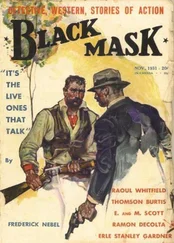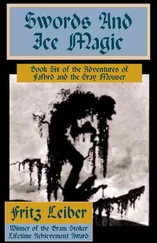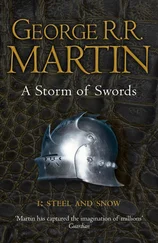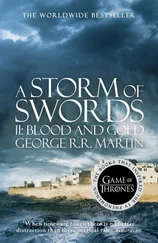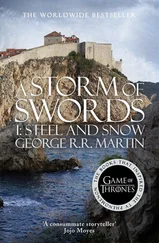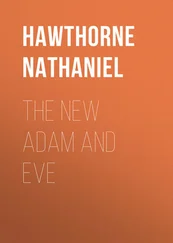“Now gentlemen,” smiled the mage. “Please stand with your toes touching the parapet. I wish you godspeed, and ask you to take one step forward.”
“The parapet impedes all forward motion,” protested Bront, but in reflexively pushing his right foot against the wall, he felt it swing effortlessly forward, and come to rest on level rock, and found himself standing on a vast, rolling plateau, beneath the rosy light of a far redder sun, at high noon…
Early on their third day’s march, the weary Bront fell back a bit, and watched Hew’s progress on ahead. The scaffold-monkey, though smallish and squarish, was very tight-knit and nimble. He’d evolved a steady, dancing kind of gait to deal with the terrain, and while Bront had scorned the indignity of it from the first, he’d been forced, at length, to imitate—in a more ponderous way, to be sure—that same half-dancing progress.
The endless plateau received—as they quickly learned—recurrent rains, and this red sun’s more feeble light yet had power to nourish a lush growth of lichens and algaes on the fissured granite. This tough greenish-purplish growth flourished in a springy-clingy carpet, which cushioned one’s boot-soles yet constantly tripped them if they dragged.
Bront disliked this world, the rubescent gloom that was its daylight. What had happened to the sun? Where was its golden fire and fierceness? The landscape seemed not over-populous. They’d seen distant caravans—what looked like men on tall, spindle-legged mounts—seen other solitary journeyers, pairs and trios too. Human-seeming, a good half of these transients. Occasionally, across the furry turf, far flocks of rock-toads moved, batrachian shapes the size of horses grazing the lichens, then drifting on in a lurching, wriggling way to farther pasture. None of these other beings showed any wish to intercept their path. All seemed bent on their own business here on this later Earth, and Bront was vexed that he could not imagine that business. What was everyone doing here?
Irksome too, he found Hew’s endless silence. He had at the outset, of course, told Hew he did not wish to speak to him. But the man might have tried to talk him out of this once or twice! Instead he had marched perfectly mute for more than two days now—save for the exchange of some polite syllables, during the business of making each night’s camp.
“Very well!” Bront at last erupted. Hew turned to face him.
Entering the last quarter of its transit of this endless terrain, the sun’s red grew purplish, while the east took on shades of maroon. It gave one an underwater feeling, to move through air so richly hued. “I wish to know,” he told Hew stiffly, “all that you know of this task we’re at. Mere civility, I’d think, would have prompted you to share that by now!”
“Permit me to ask,” replied Hew. “Is it your wish that we should speak to one another now?”
“Have I not just said so?”
“And that we should speak to one another henceforth?”
“Yes.”
“I’m delighted. I will tell you as clearly as I can what we are enjoined to do. Much is unknown, and much else unclear to me, so…we must have patience.”
“Of course we must! Do you take me for a lout?”
“Certainly not! But you exerted yourself furiously to kill me for a minor clumsiness! It’s only natural I should ask.”
“Well then.”
“Well then. Our mission is for me to make a delivery to the Slymires. A delivery of light. This will take the form of certain colors I will apply to a nook high in their dwelling place within the Crystal Combs. Hence my bandolier of tints.”
A gesture here at his harness, which Bront had noted he never took off till just before sleep, taking it then inside his cloak with him when he lay down.
“And what colors are you to apply?”
“I don’t yet know the colors I shall use. I’ll only know them when I see where they are to go. The site always tells me the color it requires.”
“So, in a subterraneous, and, I take it, vertiginous place, we are to construct scaffolding while under heavy assault, so that you can apply some colors you have not yet identified.”
“Just so.”
“May one ask”—Bront struggled to frame his question in a civil tone—“if this bizarre and difficult exploit has some purpose, beyond driving us to grotesque extremes of effort?”
“Kadaster said—not very comprehensibly to me—that the purpose of this work was to, in his words, save this world.”
“To save this world. To save our world’s future.”
“Well, yes, I suppose so.”
Bront resettled his cuirass, and re-draped his cloak. This seemed a task not entirely unworthy of a man of his stature.
“What else can you tell me of what we are to encounter?”
“I know as little as you of this. Look southeastward there. Do you note a kind of glow?”
A plum-hued gloom had settled on that horizon. Against its backdrop, a frail blossom of golden light—just a smudge as fine as pollen dusting a fingertip—seemed to unfold from a distant hollow in the plateau.
“It must be Minion,” Bront said. “Let’s press on. We might make up our load of… scaffolding before we sleep.”
Full dark drew down as they reached the broad depression where Minion lay like a nest of jewels. For some time they’d been hearing the noise of it across the plateau, a faint exhalation which was now resolved into a tumult of music, laughter, exclamation, and the rattle of myriad wheel-rims on flagstones and cobbles. Before them, an inland sea of lamps and lanterns, tapers, torches, beacons, cressets, and flambeaux—a lake of light and uproar.
Descending into its purlieus, they encountered a vigorous trafficking, even in these more sparsely built-up industrial fringes. Here were dray-beast stables, wagon-wrights, caravan chandlers, brickyards and masonries, and the isolate but boisterous taverns that enliven all such workmen’s districts.
Clearly, commerce flourished by day and by dark, while, amidst the commercial bustle, not a few barouches of more moneyed revelers—blazing with lanterns and rocking with song—rocketed among the crowd: top-pocket gamesters rollicking through their eccentric orbits.
Hew thought a wagon-wright might have spoke-staves that would answer their need. “We want stout rungs not too wide, and then thumb-thick whipcord to ladder them on.”
“Some drovers’ provisioner might be the place for the whipcord,” suggested Bront.
“That’s well bethought! Look there—is that not a wheel-wright?”
The wright, his hair in a high comb dyed silver, was at his cups in the saw-shed with two burly mates.
“Hmmm,” he replied. “I have three-quarter cubit stock that I might sell in bulk. What footage need you?”
“Well,” said Hew, thoughtful at this moment of choice, “…I need no less than five hundred cubits of reach for the ladder work. Eight hundred staves should do.”
“By the Crack,” muttered Bront. “Is it so much weight we’ll be carrying?”
“The bulk,” said Hew regretfully, “will be substantial. Yet the scaffold will be—comparatively—of gossamer thinness for the span it must cross and my weight, which it must bear.”
“Then I’d best engage the jack-haul now. He’ll need time to make up such a load.”
Bront, stoically sidestepping careening carriages of yodeling revelers, found a dray stable nearby. The stable neighbored a very active tavern, and within the yard it took some halooing to find a jack-haul to serve him. This one lay in clean straw on his stomach, his chin resting on his huge crossed arms. “How may we help you?” he rumbled.
“I need to engage one of your brotherhood for strenuous drayage through tunnels and up into the Crystal Combs, the said drayage involving self-defense against violent armed assault.”
Читать дальше


